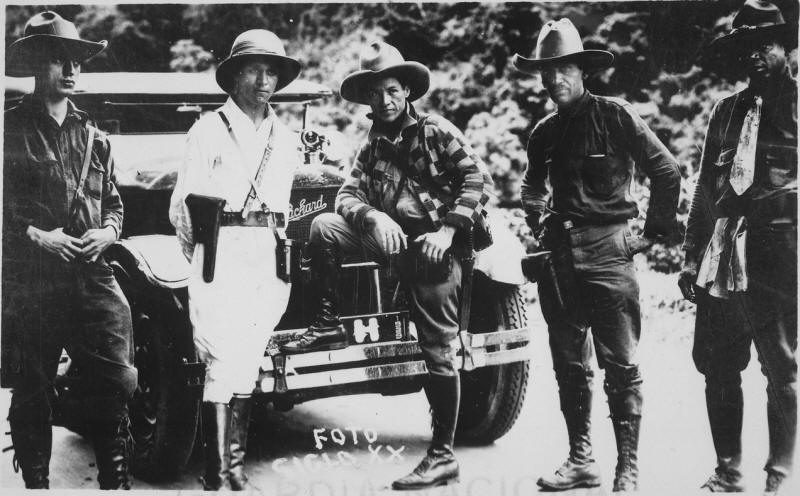|
Photo
USNA1-2.1. Sandino and
staff along the
Río Coco.

ACS-EDSN.jpg)
Undated photo, probably late 1927 or
early 1928, with Sandino front and
center, along what looks like the
banks of the Río Coco. Again,
the men seem most interested in
displaying their rifles.
Perhaps this was during the Civil
War, after Sandino's successful
journey to Puerto Cabezas on the
East Coast to secure arms (Nov-Dec
1926).
|
|
Photo
USNA1-2.2. Sandino and
staff in jungle
camp.

ACS-EDSN-camp1.jpg)
ACS-EDSN-camp2.jpg)
This is a wonderful photo, probably
1927-28. The black line
obviously points to Sandino.
Who is the small compact mustached
man to his right? (Sandino
himself was physically small; the
man next to him must have stood five
feet tall or less.) All the
men's scarves would have been of red
& black.
On the left side of the big
photo appears what looks like a
man of African phenotype with a
distinctive top hat.
Perceptive reader Victor Sánchez
suggests it might be "Saint
Gilbert Pierre Charles, the
'bandit' from Haiti mentioned in
the report about the arrest of
Manuel María Jirón Ruano" (see
Top 100, p. 27).
On the right side, one of
Sandino's men holds a Thompson
sub-machine gun.
|
|
Photo
USNA1-2.3. Sandinistas along the
banks of the Río
Coco, ca. 1928.
-EDSN-Rio.jpg)
Undated, ca. 1928. Who's the
woman with the riding boots and
holstered pistol? Blanca Aráuz?
Teresa Villatoro? The shed,
the roadway, and the logs positioned
along the riverbank make this look
like a lumber camp of some kind,
perhaps on the Río Poteca or Coco.
|
|
Photo
USNA1-2.5. Sandino and his
entourage in
Mexico.
ACSMexico1.jpg)
This photo has been published in
plenty of places. The black
lines (l. to r.) point to:
Gregorio Urbano Gilbert, José de
Paredes, Sandino, unknown woman
(notation on photo says "Arauz?"),
and Faribundo Martí.
|
|
Photo
USNA1-2.6. Sandino
on the Outskirts of San Salvador en route to
Mexico, June 1929.

Among the most famous of Sandino
photos. From left to right:
Rubén Ardilla Gómez (Venezuelan); José de Paredes
(Mexican); Gen. Sandino;
Agustin Faribundo Martí (Salvadoran); and
Gregorio Urbano Gilbert (Dominican).
|
|
Photo
USNA1-2.7. Pedro José Zepeda in
Mexico.
-ZepedaMexico.jpg)
Writing on
back: "Center figure is Zepeda." The
Nicaragua-born Pedro José
Zepeda
was a leading Sandinista activist in
Mexico City from mid-1929. The
figure on the left is probably the
journalist and activist Norberto
Salinas de Aguilar, and on the
right, the philosopher, writer, and
former Minister of Public Education
in Mexico, José Vasconcelos.
|
|
Photo
USNA1-2.8. US
Marine Corps aviator 2nd Lt. Earl A. Thomas
hanging from a tree, Oct. 1927.
ThomasOct1927.jpg)
.jpg)
On October 8,
1927, two Marine aviators were shot
down near Zapotillal Ridge north of
Quilalí in the eastern Segovias.
The Sandinistas captured the airmen,
tried, and executed them, then took
this photo and sent it to the
Marines in Ocotal. The
photograph infuriated the Marines
while absolving them from treating
the rebels as belligerents under the
1907 Hague Convention. For
more on these contexts, see
PC 27.10.12
(O'Shea Engagement with the Enemy at
Sapotillal). The second photo
shows the photograph pinned to a
bulletin board, probably at the
garrison in Ocotal.
|
|
Photo
USNA1-2.9. Captured US flag in
Mexico City.

GustavoMachadoUSFlag.jpg)
This might be the flag captured by
the Sandinistas in the battle of Las
Cruces on 1 November (see
PC 27.11.02b Gould).
On the same day, Sandino sent a
message to General Manuel Echevarría
describing the captured flag in
exacting detail (see
EDSN 27.11.01c).
More likely, this is the flag
referenced by Manuel María Girón
Ruano in his statement to Capt. H.
H. Hanneken before his execution
(see
Top 100, p. 27).
As Girón related, the Venezuelan
communist and Sandinista activist
Guatavo Machado "visited the bandit
camp at Garrobo last May [1928]
where he secured the American flag
stolen from the [Lone] Star Mine.
The flag was then photographed,
which appeared later in his paper
with a story of its having been
captured from the Marines."
This photo was probably taken inside
the headquarters of the Hands-Off
Nicaragua Committee or the
Anti-Imperialist League in Mexico
City; note the announcement for a
"gran meeting" with Gustavo Machado.
|
|
Photo Cluster
USNA1-2.10. EDSN Jerónimo
Rivas and Manuel Antonio Lacayo, La Ceiba,
Honduras, 1929.
EDSN-CeibaHonduras.jpg)
EDSN-Honduras.jpg)
Caption of first photo reads:
"Members of Sandino's General Staff
who accompanied him to Mexico, taken
in Bonilla Park, La Ceiba, Honduras,
beneath Statue of Manuel Bonilla."
Individuals identified as (1)
Jeronimo Rivas General "33" and (2)
Manuel Antonio Lacayo. One can
also see the silhouettes of four men
behind them. The second photo
has no caption but it's clearly the
same two white-shirted men and same
four other men accompanying them.
|
|
Photo
USNA1-2.11. Sandinista jefes Juan
Altamirano and Carmen Torres, Yucatán, Mexico,
Feb. 1930.
JAltamirano&Torres.jpg)
.jpg)
Identifying names are written over a
romantic note ("un recuerdo") penned
by Carmen Torres to María
Blanca Torres. Carmen Torres,
as the notation indicates, was
imprisoned in Jinotega for homicide
on 13 February 1932.
|
U S N A 1
P H O T O P A G
E S |
|
1 |
2 |
3 |
4 |
5 |
6 |
7 |
8 |
9 |
10 |
11 |
12 |
|
|